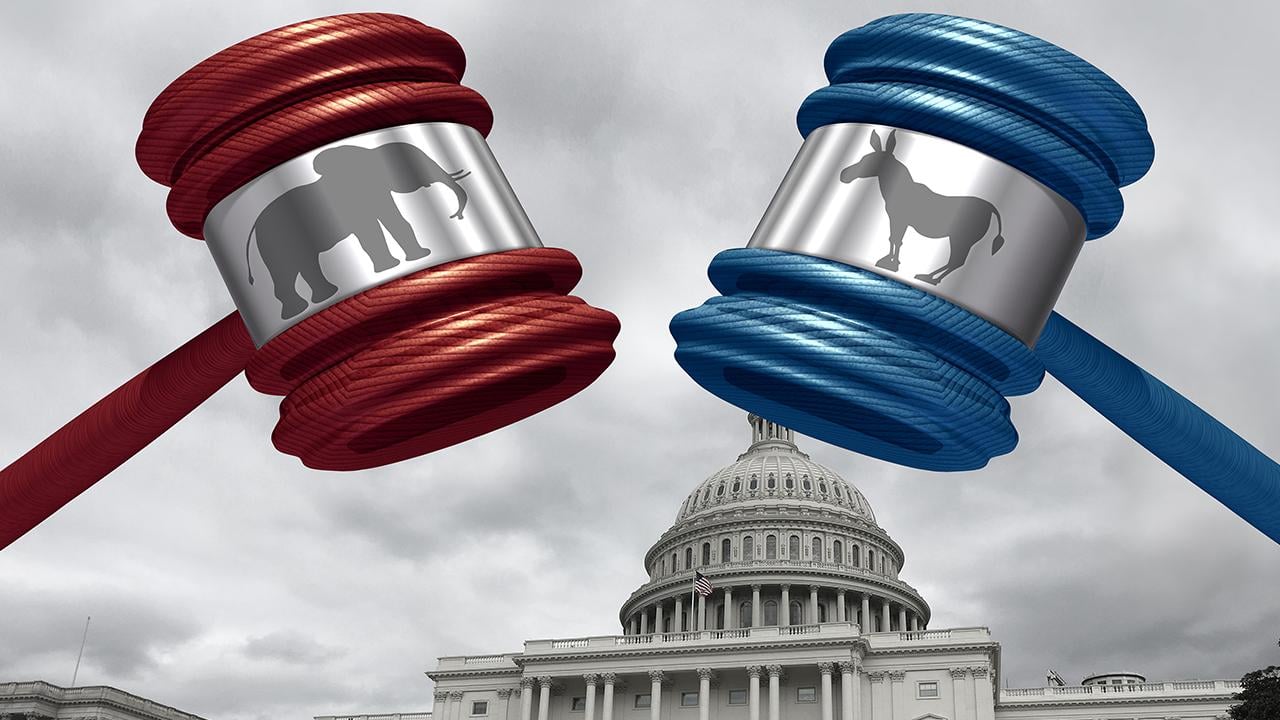
In 2019 and 2021, Donald Trump was impeached by the House of Representatives, thereby becoming the third president to be impeached (as Nixon had resigned before House impeachment), and the only president to be twice impeached. House Democrats have thus demonstrated that they have no qualms about impeaching Republicans. On the other hand, earlier this week House Republicans have shown that they do not have the political will even to impeach a Cabinet Member against whom the case for impeachment is compelling.
On November 13, 2023, Rep. Majorie Taylor Greene (R-GA) obtained a House vote on her resolution to impeach Homeland Security Secretary Alejandro Mayorkas — a Biden official who has thumbed his nose at Congress while leaving the border open to all comers. Eight House Republicans apparently believed that the charges against Mayorkas were not supported as they voted to refer the matter to a Committee for further study. The “no votes” were: Reps. Ken Buck (R-CO), Darrell Issa (R-CA), Tom McClintock (R-CA), former Acting Speaker Patrick McHenry (R-NC), John Duarte (R-CA), Virginia Foxx (R-NC), Cliff Bentz (R-OR), and Mike Turner (R-OH). On top of that, a dozen Republicans did not bother to vote on the measure.
There are now 221 House Republicans, but almost 10 percent of them do not care that the number of aliens who have entered illegally into the country under the Biden Administration now exceeds the population of at least 22 states. Their reticence reminds us of former Senator Alan Simpson (R-WY) who called Democrats “the evil party” and Republicans “the stupid party.”
Democrat attacks on our 45th president began before he was inaugurated, continued during his presidency and have only intensified after he left office. Since March 30, 2023, President Trump has been indicted four times: state charges of falsifying business records by leftist Democrat Manhattan District Attorney Alvin L. Bragg, Jr.; federal charges relating to mishandling of classified documents at Mar-a-Lago brought in Florida by Biden partisan Jack Smith; federal charges relating to overturning the 2020 election brought in the District of Columbia, also by Jack Smith; and state charges by leftist Democrat Fulton County District Attorney Fanni Willis.
With that pattern in mind, let’s go back and see how Congressional Democrats treated Donald Trump as President. The first impeachment was in December 2019, in an obvious attempt to damage Trump’s 2020 re-election chances. H. Res. 755, was introduced by Rep. Jerrold Nadler (D-NY), asserting two articles of impeachment. The first alleged “abuse of power” in Trump asking the Ukrainian government to investigate actions by Vice President Biden; the second alleged “obstruction of Congress” for withholding information from Congress. The House voted 230 to 197 to impeach on the first article, and 229 to 198 on the second, with no Republicans supporting impeachment. The Senate acquitted on both: 52-48 for acquittal on the “abuse of power” charge, and 53-47 on the “obstruction of Congress” charges. The only Republican Senator to vote to convict was Mitt Romney (R-UT), and only on Article I.
The Democrats impeached Trump again on January 11, 2021, just nine days before his term ended. Rep. David Cicilline (D-RI) introduced H. Res. 24 containing just one article of impeachment which dealt solely with Trump’s January 6, 2021 speech. That article accused Trump of “inciting violence against the Government of the United States,” in that he made “false claims that ‘we won this election,’” having stated “if you don’t fight like hell you’re not going to have a country anymore,” and asserting that some of those who heard the comments then engaged in a struggle with police and an incursion into the Capitol building. No other statements or actions were alleged.
Thus, the entire article of impeachment revolved around Trump’s political statements. In context, Trump’s comments clearly regarded fighting for election integrity, not trespassing on Capitol grounds. In asking supporters at his rally to go to the Capitol, Trump admonished the crowd to “peacefully and patriotically make your voices heard” — a statement that was, for some reason, left out of the article of impeachment.
This time, six more Republicans voted in favor of impeachment. The Senate vote was 57-43, still well short of the required two-thirds to convict and remove Trump from office. Seven Republicans voted to convict: Richard Burr (R-NC), Bill Cassidy (R-LA), Susan Collins (R-ME), Lisa Murkowski (R-AK), Mitt Romney (R-UT), Ben Sasse (R-NE), and Pat Toomey (R-PA).
What lessons for today can Americans draw from the twin Trump impeachments? We suggest there are at least two.
1. Facts Do Not Matter to Democrats or Rinos.
Recall that President Trump was first impeached for asking Ukraine to look into Biden having compelled the Ukrainian government to stop investigating Burisma — his son’s benefactor. Now that House Republicans have unearthed evidence that the Biden family’s corrupt business dealings are much worse than could ever have been imagined, what is to be done? No Democrats or Rinos seem to care in the least: none are calling for Biden’s impeachment, or even an investigation. Rather, they have circled the wagons. Rep. Jamie Raskin (D-MD) calls the House inquiry an “epic flop of an investigation.”
An epic flop? Really? In January 2018, Biden himself bragged that as Vice President in 2015, he had blackmailed the Ukrainian government into firing top prosecutor Viktor Shokin with threats to withhold $1 billion in U.S. aid. “‘I looked at them and said: I’m leaving in six hours. If the prosecutor is not fired, you’re not getting the money,’ Biden told the Council on Foreign Relations in 2018. ‘Well, son of a bitch. He got fired.’” And why was Biden so insistent that Viktor Shokin be fired? Shokin has explained: “[Then-Ukraine President Petro Poroshenko] understood and so did Vice President Biden that had I continued to oversee the Burisma investigation, we would have found the facts about the corrupt activities that they were engaging in. That included both Hunter Biden and Devon Archer and others.”
We now know that Trump had valid reason to ask Ukraine to investigate the Bidens’ business dealings. Thus, in a demonstration of poetic justice, the same facts on which Trump’s 2019 impeachment was fraudulently based actually justify impeaching Biden.
2. Impeachments Should Not Be Based on Speeches.
The second lesson is that Presidents should not be impeached for their words. As Rep. Jim Jordan pointed out during Trump’s second impeachment trial:
[t]he First Amendment argument [made by Democrats against Trump] is very dangerous.… The president is engaged in constitutionally protected speech – speech that is protected by the First Amendment, the very document … that we take the oath to uphold and they’re going to try to impeach him for that.
If Trump’s call to “fight like hell” for election integrity is an impeachable offense, what about Senator Charles Schumer(D-NY), who threatened Justice Brett Kavanaugh? “I want to tell you Kavanaugh. You have released the whirlwind and you will pay the price. You won’t know what hit you,” Schumer threatened. He was almost right. On June 8, 2022, a man was arrested outside of Kavanaugh’s home with a “small arsenal,” and admitted he had planned to kill Justice Kavanaugh. By the Democrat standards of the 2021 impeachment, Chuck Schumer has also committed “high crimes and misdemeanors.”
Consider the inflammatory rhetoric generally used by Democrats. Rep. Ted Lieu (D-CA) threatened “widespread civil unrest” if Trump fired special counsel Robert Mueller. Rep. Maxine Waters (D-CA) defended widespread looting and arson in Los Angeles during the Rodney King trial in 2002, amazingly defending mob crime not as “rioting” (bad), but as “insurrection” (good)! Numerous Democrats have also called for supporters to “fight like hell,” including January 6 committee member Rep. Jamie Raskin (D-MD).
Each of these statements, including Trump’s, are protected by the First Amendment. None of them constitute “high crimes and misdemeanors.” None should be the basis for an impeachment.
Editor’s Note: To read the articles in this series, please click here.






